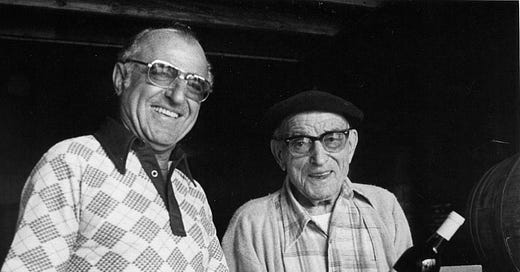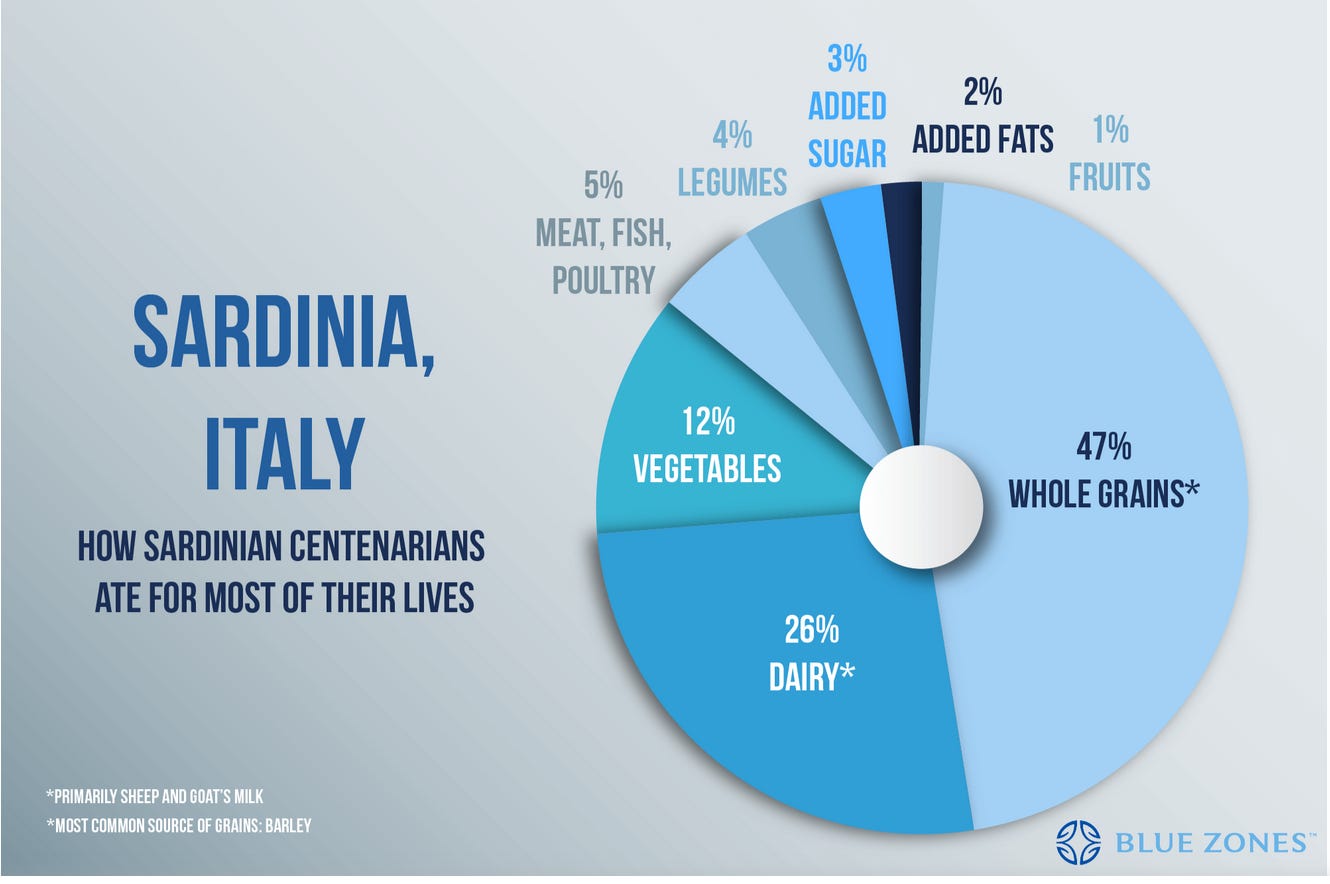The Sardinian Secret to Living to 100
Explore five lessons from Sardinia’s centenarians that can extend your life.
👋 Hello, I’m Kevin Ferguson, author of 🍷 Rain on the Monte Bello Ridge,🍷 my forthcoming memoir about health, aging and winemaking. (Read the origin story of the book.) 🍇 The Centenarian Playbook is my newsletter, which features longevity tips and stories from Grandma Kay’s long life. It also includes stories of the Gemello Winery, which her late husband, Mario, ran for nearly half a century. 📖 I’m sure you’ll find my maternal grandparents are quite lovable characters.
1980: Great Grandpa John Gemello, 97 (right) and son, Mario, 64.
Unlocking the Code to 100 Years and Beyond
It may seem like you are seeing more articles about 100-year-olds celebrating birthdays. Nevertheless, centenarians are still exceedingly rare. They represent one in every 3,755 of the U.S. population. In other words, just over a quarter of one percent (.027 percent) have reached 100 or older.
My great grandfather, John Gemello, who died in 1981, fell just short of that exclusive club. He passed away a month before his 99th birthday. Back then, centenarians were even more rare: representing one in 16,666 Americans, or .006 percent.
The genes John Gemello passed down to his offspring didn’t have quite the magic formula for his children, though. Among his five children, Sally was the only one to make it into her nineties. She died at 95. Her brother, Mario, my grandfather, passed away at 89, due to prostate cancer.
Coincidentally, on the other side of my mom’s gene pool, Grandma Kay (Mario’s widow) is beating all odds. She’s still going at 103.
“A long healthy life is no accident. It begins with good genes, but it also depends on good habits. If you adopt the right lifestyle, experts say, chances are you may live up to a decade longer,” wrote longevity expert Dan Buettner in a National Geographic article on “The Secrets of Long Life.”
Buettner is the author of the book, The Blue Zones: Secrets for Living Longer. In it, he explores the six “blue zones,” defined as the world’s aging hot spots that have the highest concentration of centenarians.
Sardinia: Centenarian Hot Spot
One of the Blue Zones is a section of the Italian island of Sardinia. What’s unique about it: It has 10 times more centenarians per capita than the U.S. Another stunning fact: male centenarians are pulling more of their weight. The male-female centenarian ratio is nearly 1 to 1. By contrast in the U.S., women outnumber men among 100-year-olds by nearly a 6 to 1 ratio.
In 2004, Buettner’s research team set off to investigate a rare genetic quirk carried by its inhabitants. The M26 marker is linked to exceptional longevity, and due to geographic isolation, the genes of the residents in this area of Sardinia have remained mostly undiluted, he says.
Both good genes and healthy habits are often working in concert for a person to make it to 100 and beyond. Dr. Tom Perls, of the New England Centenarian Study, says to get to 100, about 60 percent is in your control through healthy behaviors, while genetics influences the other 40 percent.
Here are five longevity lessons you can learn from these villages on Sardina in terms of setting up your healthy lifestyle and environment, according to Buettner’s Blue Zone researchers.
Diet: Eat a lean plant-based diet accented with meat. The classic Sardinian diet consists of whole-grain bread, beans, garden vegetables, fruits, and, in some parts of the island, mastic oil.
Family: Sardinians tend to put family first and celebrate their elders. People who live in strong, healthy families suffer lower rates of depression, suicide, and stress, Buettner says.
Exercise: Walking five miles a day or more as Sardinian shepherds do provides all the cardiovascular benefits you might expect,and also has a positive effect on muscle and bone metabolism without the joint-pounding of running marathons or triathlons.
Wine: Sardinians drink wine moderately. Cannonau wine has two or three times the level of artery-scrubbing flavonoids as other wines.
Goats milk: A glass of goat’s milk contains components that might help protect against inflammatory diseases of aging such as heart disease and Alzheimer’s.
There are three buttons at the bottom of every post: “like,” “comment,” and “restack.” Restacking is sharing in digital form. It goes out to the Substack community. If you enjoy the content and click “Restack,” it helps a lot.







What great longevity guideines. I totally agree with Dan Buettner when he says “A long healthy life is no accident. It begins with good genes, but it also depends on good habits. If you adopt the right lifestyle, experts say, chances are you may live up to a decade longer,”
Loved this. When I did my DNA discovered I had some ‘roots’ in Sardinia. Hopefully the genes will follow!